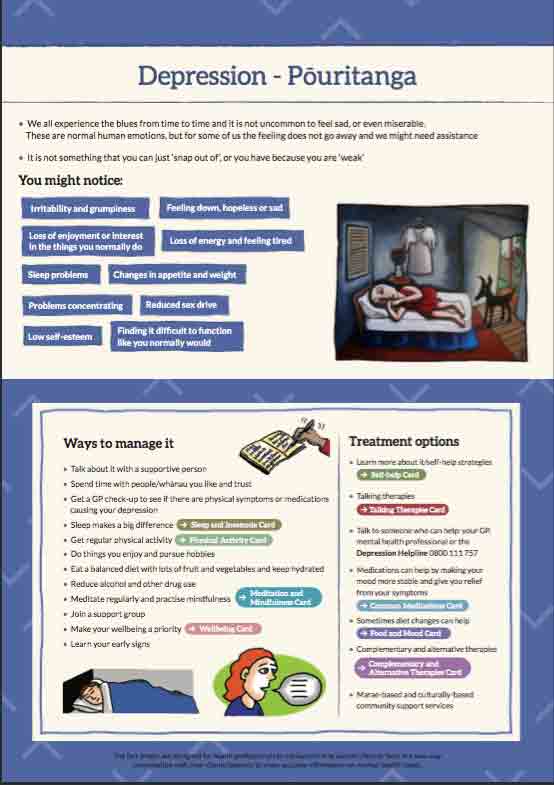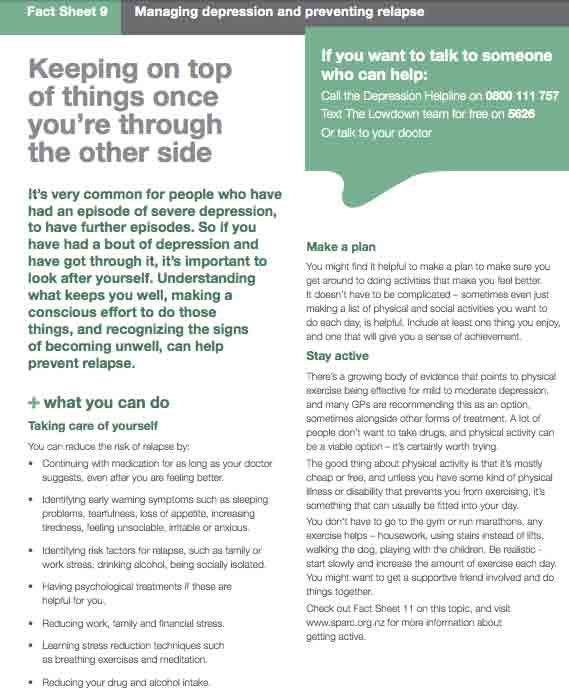- Remember that small steps are the key to change – choose what feels manageable and build from there. Once you do 1 or 2 small things, you may feel more able to add in others.
- Put your self-care first – this builds your resilience so you can cope better with the challenges of life and can manage the symptoms of depression better.
- Look after your physical health as this helps your mental wellbeing.
- Have ways to reduce and manage stress as this increases your resilience.
- Getting help when you need it is a sign of strength not weakness.
- Staying connected to whānau and friends can help you feel better.
- Spending time in nature is key to your wellbeing.
- Finding a purpose increases your sense of meaning and belonging.
Low or no data? Visit zero.govt.nz, scroll down the page then click on our logo to return to our site and browse for free.
Depression – living well with
Living well with depression
Key points about living well with depression
- It's understandable that when you're depressed, low energy, loss of pleasure and increased anxiety get in the way of doing the things you used to enjoy.
- However, taking small steps back to those things can help you to live well with depression – and may even be the start of the way out of it too.
- It's important to remember that most people with depression will recover.

1. Put your self-care first
Get into a daily routine by doing small things, eg, getting out of bed, opening the curtains to let the light in, showering, making your bed and having breakfast. Choose 1 thing at a time to do every day and when you’ve got that habit back, choose the next thing. Find out more about caring for yourself when you feel low. Building a routine gives you a foundation to structure your day and creates achievable goals.

Image credit: Canva
2. Look after your body to help your mind
Looking after your body with exercise, nutritious food and adequate sleep also helps you look after your mental health. Find out more about mental health and your body.
Pick one of these things to start with:
- Sleep in your bed every night (not in front of the television) and make sure you get to bed early enough for 8 hours a night. Try to wind down and relax before bedtime with screens wo that your body is more ready for sleep. Read more sleep tips.
- Keep a bottle of water in your car or handbag so you can stay hydrated.
- Avoid alcohol and other recreational drugs – you might get an initial boost in mood, but will feel worse afterwards. Read more about alcohol and mental health.
- Eat healthy meals with nutrients that give you energy and boost your mood. Learn more about healthy eating basics. Try to eat regularly even if you don't feel like it.
- Go for a walk every day, even if it's just a short one. Physical activity reduces the symptoms of depression and being outside in natural light can help your mood. Exercise boosts the 'feel-good' hormones in your brain and can distract you from difficult thoughts. Once you start to move your body you're likely to want to do more. If walking seems too much, you can start with stretches or chair-based exercises. Find out more about physical activity and mental health and the general benefits of being active.
3. Cut back on stress
It’s harder to cope with everyday stress when you’re depressed, so it’s a good idea to find ways to reduce it. Being less stressed helps you to be more resilient when times are tough. Things you can do to reduce stress include:
- Postpone major life changes such as moving house or changing jobs until you’re feeling better.
- Remember to take holidays from work so you can get away from your everyday life. Often continuing work is an important part of maintaining routines and social connections, but you might need a period of time off work to help you recover. Talk to your employer about options for time off or reduced duties if that feels necessary.
- Get help with any tasks that feel overwhelming, eg, doing your tax return, studying for an exam, mowing your lawns or managing your garden.
- Learn a relaxation technique – try yoga, meditation, mindfulness, muscle relaxation or a breathing technique.
- Download a mental health app or use some of the resources on the 1737 Need to talk(external link) site.
- Do something enjoyable in your leisure time other than just blobbing out in front of a screen. This might be reading a good book, listening to music, doing a handcraft or other hobby that involves making something – remember to start small so it’s manageable.
4. Get help
We all need help sometimes. Getting help when you need it is a sign of taking responsibility for yourself – it shows strength, not weakness. Here are some suggestions that may help:
- Find books, online courses and apps that help you understand more about your depression and learn some strategies for managing it – have a look at the ones listed in 'more information' below as a starting point.
- Connect with another person who is supportive and understands what will help can make all the difference – find a counsellor or therapist(external link) to help you work through issues you’re facing.
- Joining a support group is great for realising you’re not alone and finding out what other people do to manage their depression – find a support group (external link)near you, or check out one online if there’s nothing close to you.
- If you think your depression could be related to a particular event in your life (eg, abuse or bereavement) look for support specifically for this. See our care and support section to find links to support groups and organisations.
- Get medicine if you need it – talk to your healthcare provider to find out whether antidepressants would be a good idea for you.
5. Stay connected
It’s easy to withdraw from whānau and friends when you feel depressed. But actually, strong connections can help you get well faster and help you stay well for longer, so tell your whānau and friends what you're experiencing. They can be your strength and provide a sense of belonging and support (tautoko) when you need it. Make a pact with yourself to do one of these things in the next week:
- Meet up with a friend for a coffee.
- Help out at the local community centre or marae.
- Spend time with children (tamariki) or grandchildren (mokopuna) – they can be great for lifting your spirits.
- Go to a whānau birthday, anniversary or holiday get-together.
- Make a meal with a friend.
- Go for a walk or a swim with friends.
- Send someone a message. This could be a simple "hello" or a picture you think they'll like.
- Find a group exercise class.
6. Spend time in nature
Nature is key to improving your wellbeing. Researchers have found that spending time out in the natural world improves your physical and mental wellbeing. To use nature to boost your wellbeing, try one of these things today:
- Go to the beach and having a walk or swim. Walk barefoot in the sand and feel connected to the earth.
- Head to the bush and take time to stand still and listen to the natural sounds and smell the fresh air.
- Do some physical activity outdoors, eg, going for a run, walk or cycle ride in a park.
- Get your hands dirty in the garden, planting some vegetables for your whānau or flowers to bring colour.
- Join a conservation group that plants trees in your local community.
- Take part in one of the citizen scientist counts of birds, bees or butterflies in your garden or neighbourhood.
Find out some more ideas for spending time in nature.

Image credit: Canva
7. Find a greater purpose
Connecting with something beyond yourself is a great way to add more meaning to your life and to distract yourself from your own problems. Your wairua (spiritual wellbeing) is one of the most important yet most overlooked parts of your wellbeing. If you’ve been feeling like you don’t belong anywhere or that life has lost its meaning, try one of these ideas to help you find your place in the world again:
- Go to places that you know nurture your soul, eg, a church or a temple.
- Give yourself permission to reflect and grow.
- Learn what it is that keeps you peaceful and content.
- Write or draw about what has greatest meaning to you.
- Go home and spend time in the place you’re from.
- Talk to a spiritual adviser, eg, a priest or a tōhunga.
- Help someone else who needs support – surprisingly, it can help you feel better too.
Read more about caring for your wairua.
The following links provide further information about living well with depression.
Self-tests(external link) Depression.org. nz
The Journal(external link) NZ
The Lowdown(external link) NZ
Small Steps(external link) NZ and Small Steps Facebook group(external link) NZ
Five ways to wellbeing(external link) Mental Health Foundation, NZ
How dogs can help with mental health – mind boosting benefits of dog ownership(external link) UK
Living with depression(external link) Very Well Mind, US
Brochures
Depression – Pōuritanga [PDF, 557 KB] Books on Prescription, NZ
Depression – your guide(external link) Royal Australian and NZ College of Psychiatrists
A guide to talking therapies in NZ [PDF, 564 KB] Te Pou, NZ, 2009
Apps/tools
References
- Depression(external link) Mental Health Foundation of New Zealand, 2022(external link)
- Depression – living with depression(external link) Patient Info, UK, 2023(external link)
- Living with – depression in adults(external link) NHS, UK, 2023
See our page Depression for healthcare providers
Brochures

A guide to talking therapies in NZ [PDF, 564 KB] Te Pou, NZ, 2009 for Māori, for Pacific peoples, for Asian people

Books on Prescription, NZ

depression.org.nz
Credits: Healthify editorial team. Healthify is brought to you by Health Navigator Charitable Trust.
Reviewed by: Dr Angharad Dunn, GP, Wellington
Last reviewed:





